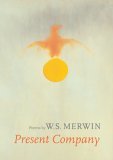
Present Company by W. S. Merwin Port Townsend, WA: Copper Canyon Press, 2005. 140 Pages. $22.00 cloth. ISBN 1556592272. Mere months after Copper Canyon Press has released Migration, W. S. Merwin's selected poems (and recent winner of the 2005 National Book Award for Poetry), the volume is incomplete. Merwin’s latest, Present Company has appeared, and the poet, a fixture on the literary scene now for over 50 years, begins yet another phase.
It is evident from this most recent volume that Merwin is aging gracefully in his nature sanctuary on the Hawaiian island of Maui. His once vaunted "sustained line," while not altogether given off, is less and less in evidence with each succeeding volume. He has grown more comfortable with himself with the passage of years however much he remains skeptical of our cultural ideas of "self."
The poems that comprise Present Company are elegies, of a sort, dedicated "To..." the various people, places and things that have graced his life. The only tension that informs the book is that between the normal 80-ish desire to speak of "the greater verities" and the long inculcated post-modern reaction against there being any such thing. The result is some 100 poems of sustained interest regularly punctuated by flashes of unusual insight. The reader will not have to be approaching 80 in order to recognize the sentiment of these lines "To Lingering Regrets":
O lovely and mournful with downcast eyes appearing to me as you are turning away to stand silent and late in a remembered light touched with amberSome verities would seem in fact to be greater and "regrets" are among them. Surely those who claim to have none suggest that they somehow have not grown to achieve their full humanity, a problem which these lines, among many others, prove Merwin does not share.
you have always been warning us too late and only as you were leavingAs for Merwn himself, he would seem to be the most tenuous of the existents, as evidenced by lines such as these from "To Myself":
I am sure you were here a moment before and the air is still alive around where you were
as it passes before you what you will never manage to remember later the missing key to the present and its unrepeated life and so you will have to make it up as plausibly as you can out of odds and ends of what someone wrote down or you may remember if memory serves you or you will conjure from those same elements and selves summoned out of some other countryThe narratives of pen and life are both problematical and absolutely essential. The poet of Present Company has lived a life wrestling with "the story." So intensely so that he has come to understand that the reticence of a few hard-won words can say more.
Also from the Library of Babel:
- Blank Verse Now and Then. January 1, 2019. “Surrey was as erratic as most young noblemen during early English history, and far more brilliant, and was imprisoned several times for temper and intemperance. In the end, he became rather impatient for the gouty, porcine, syphilis-riddled Henry VIII to die, and for the Howard faction to rule as regents to the young, fragile, son conceived of the syphilitic, Edward.”
- The Elegy and the Internet. July 1, 2005. ‘Drummond, we may remember, was the William Drummond, of Hawthornden, who Ben Jonson visited during a trip to Scotland, in 1619. The Scot took the time to jot a memorandum of Jonson's conversation, in which we learn inter alia that "he cursed Petrarch for redacting Verses to Sonnets, which he said were like the Tirrant's bed, wher some who were too short were racked, others too long cut short,"7 and "That Shakspear wanted Arte."’
- Be sure to check out the Browser's Guide to the Library of Babel.





No comments:
Post a Comment